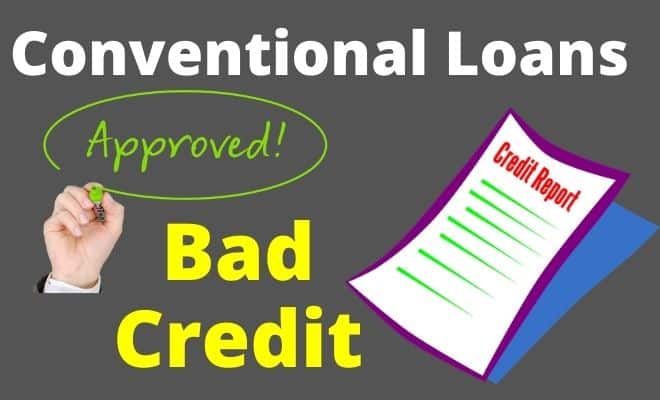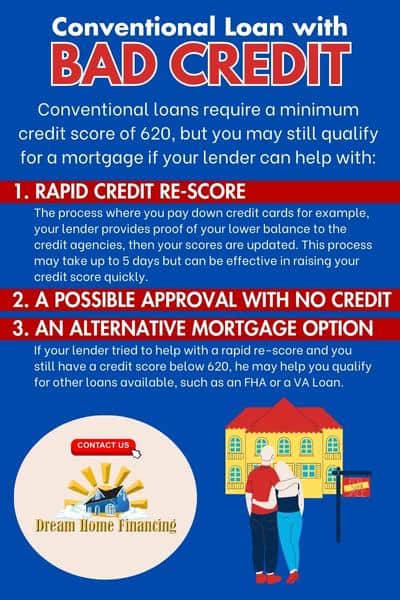Conventional Loan with Bad Credit

There has been an increase in the number of people with poor credit applying for a mortgage in recent years. One of the challenges many individuals face is how to qualify for a conventional mortgage despite having bad credit.
Conventional loans require a minimum credit score of 620, but you may still qualify for a mortgage if your lender can help with a rapid credit re-score, a possible approval with no credit, or even provide you with an alternative mortgage option.
Conventional Loan Guidelines
Conventional loan guidelines are set by Fannie Mae and Freddie Mac. Although conventional loans are not your only option, they are the most popular mortgage and the interest rates are competitive.
These are the basic guidelines or requirements for a conventional loan:
- You must be a US citizen
- Minimum credit score of 620
- Minimum down payment of 3%
- PMI required for down payments less than 20%
- 2-year work history is required
- Fully documented income
- Debt to income ratio of 43% or less
Conventional loans also have strict income requirements and require you to fully document that income for at least two years. Read more about the conventional loan income requirements.
If you are self-employed and would like to apply for a conventional loan, you will need to qualify using the income on your tax returns after your write offs. If you write off too much, then you likely need a bank statement loan. Read our article on bank statement loans.
Qualifying for a Conventional Loan with Bad Credit
If your credit score is below 620 then you currently do not meet the credit score minimums to qualify for a conventional loan. However, if you are working with the right lender there may still be hope for you.
Rapid Re-Score
Most good lenders are able to work with you to get a rapid credit re-score. This involves the process where you pay down credit cards for example, your lender provides proof of your lower balance to the credit agencies, then your scores are updated. This process may take up to 5 days but can be effective in raising your credit score quickly.
FHA Loans
If your lender tried to help with a rapid re-score and you still have a credit score below 620, then you should consider an FHA loan. FHA guidelines allow for credit scores as low as 500. However, when the credit score drops below 580 then you will need a 10% down payment.
Exceptions to the Minimum Credit Score Requirement for Conventional Loans
There are no exceptions to the 620 credit score requirement except for when a borrower has no credit scores at all. When this happens, the lender is required to use non-traditional means to determine a borrower’s credit worthiness. Examples would be reviewing rent payment history with a landlord, phone bill payment records, and utility company payment history. If after examining some of these other non-traditional avenues and it shows the borrower has been making on time payments, then the loan may be approved.
What to Do When Turned Down By a Lender
We receive calls from many people who were told by a lender that they cannot qualify for a mortgage. The reality is that many people simply cannot qualify. However, often times it is simply the lender who has guidelines that are not flexible enough and there may be other options out there for you.
If you have been turned down by a lender because your credit is too low, you do not have a down payment, or even have a recent bankruptcy… then let us help you. There really are some lenders out there who can find creative solutions to help you purchase a home.
Related Questions
What credit score is needed to buy a house?
If you are applying for a conventional loan, you will need a minimum credit score of 620. However, you may be approved for an FHA or VA loan with a credit score as low as 5o0.
Should I try to raise my credit before speaking to a lender?
If possible, it would be helpful to improve your credit scores before speaking with a lender. However, many good lenders can help provide you with some assistance in raising your credit if you find your scores are too low after applying for a mortgage.
What if I have extenuating circumstances which hurt my credit?
There are so many real situations that result in someone’s credit getting destroyed. Identify theft, divorces, medical issues, and even a death in the family can result in a poor credit situation. However, Fannie Mae and Freddie Mac guidelines do not provide much room for lenders to make a judgement call on whether to grant an exception.
Are conventional rates better than other mortgage programs?
Interest rates for conventional mortgages are extremely competitive. However, depending upon your credit score you may find that a VA or FHA loan could have a lower rate.
Will conventional mortgage rates be impacted by bad credit?
Credit scores play a major role in determining your interest rate. If you have a credit score of 620, your interest rate will be higher than if your credit scores were 700 for example. Lenders have a rate sheet that has rate adjustments as the credit scores improve.
Related Articles
Bad Credit Mortgage Lenders – This article discusses the mortgage and lender options if you have bad credit.
Conventional Mortgages – See what conventional loans are all about and what to expect when applying for a mortgage
Fannie Mae Credit Guidelines – This resource will take you directly to the Fannie Mae guidelines and a section that discusses minimum credit score requirements.

